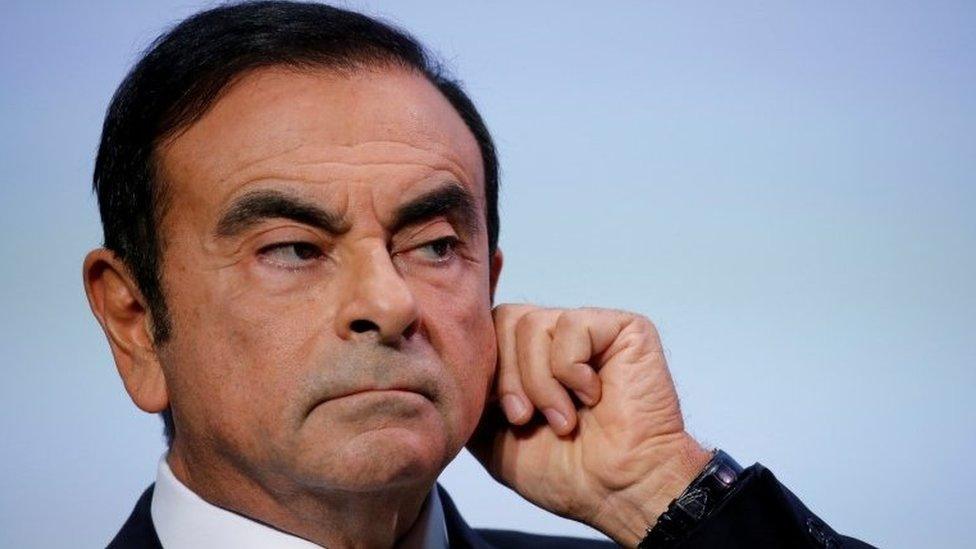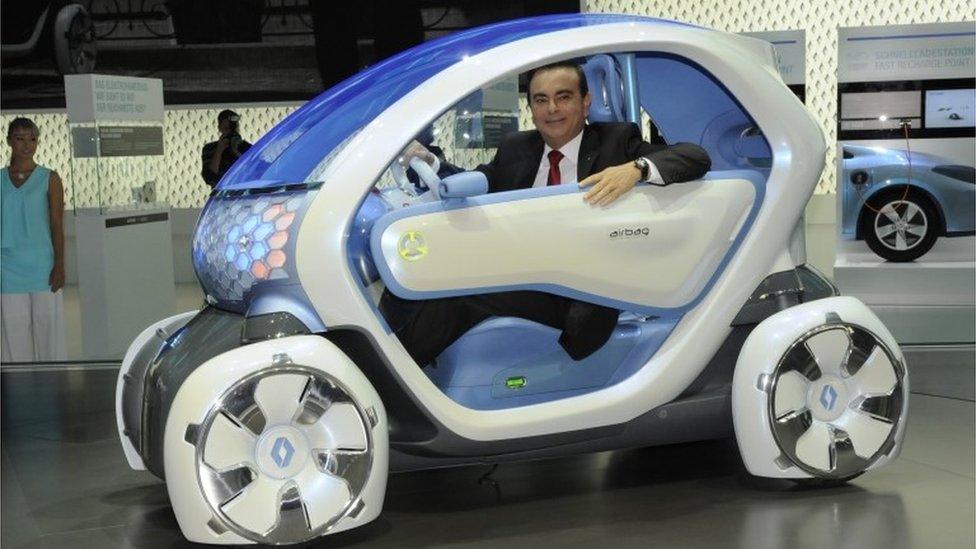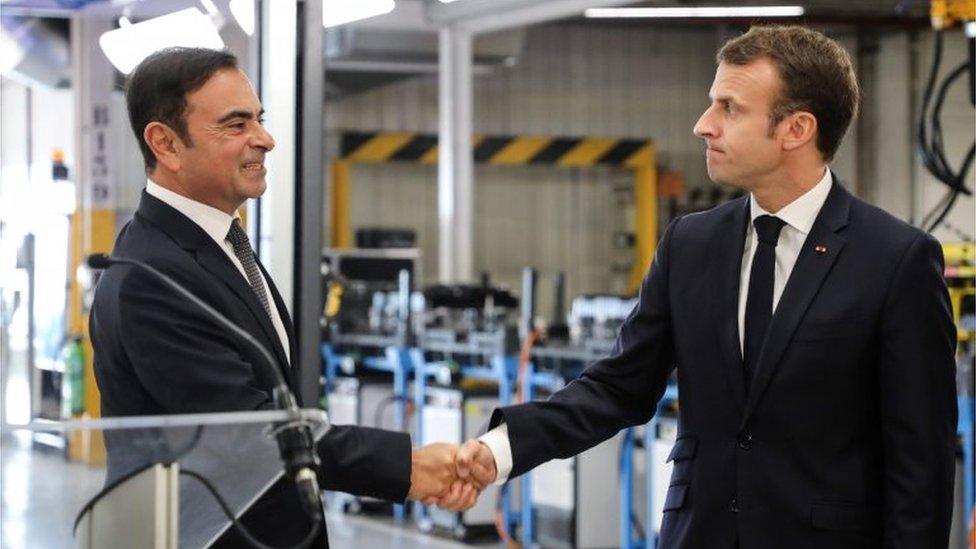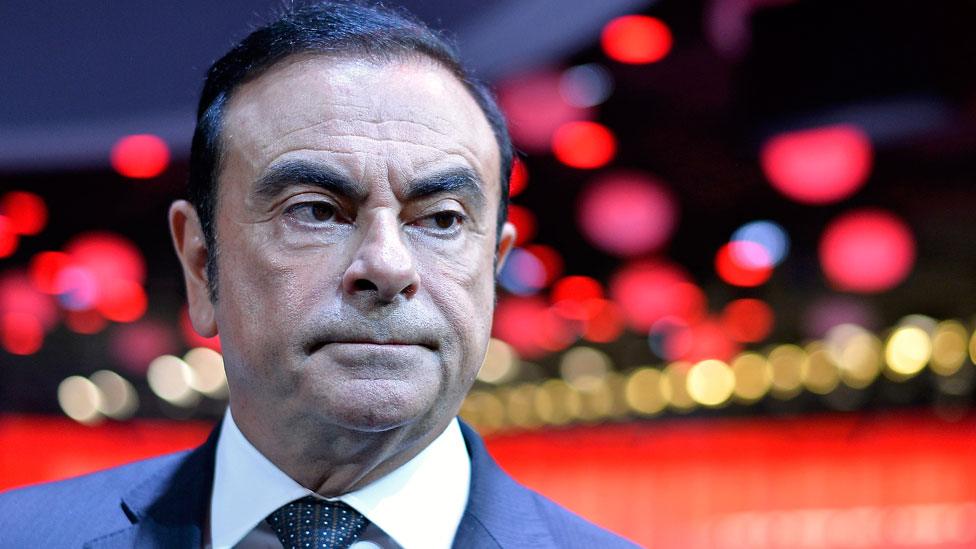Carlos Ghosn: Renault-Nissan's relentless 'cost killer'
- Published

In Japan, Carlos Ghosn's hero status was once so big that his life was serialised in one of the country's famous cartoon comic books.
That was in 2001, when his revival of the ailing Nissan had barely begun and when the idea of a foreigner running one of Japan's venerable companies was met with curiosity and bafflement.
But Renault, which had bought a large stake in Nissan two years previously, had high hopes for the Brazil-born Mr Ghosn. He did not disappoint.
Mr Ghosn not only turned around Nissan, he became a superstar in the process.
In a 2011 nationwide poll of who the Japanese would like to run their country, he came seventh, in front of Barack Obama (ninth). Another poll said he was the man most Japanese women wanted to marry.
All that serves to illustrate just how shocking it was when Mr Ghosn's glittering career abruptly imploded.
In an industry of big corporate beasts, the 64-year-old was up there with the biggest, running an alliance of three global carmakers - Renault-Nissan-Mitsubishi - on two continents as both chief executive and chairman. He was in charge of 470,000 employees, selling 10.6 million vehicles last year from 122 factories.
Satoru Takada, an analyst at Tokyo-based consultants TIW, said Mr Ghosn was seen as "the cornerstone of the alliance". It was Mr Ghosn's "charisma" that glued the alliance together, he said.
Cost killer
Mr Ghosn started his career at French tyremaker Michelin, spending 18 years in various divisions and countries.
Worried, perhaps, that the top job at the family-owned Michelin might elude him, he moved to Renault in 1996. He was soon put in charge of the loss-making South America division.
The division's radical overhaul - and return to profitability - earned him a nickname that has stuck: Le Cost Killer.
Mr Ghosn doesn't particularly like the moniker, arguing that if corporate survival plans depended only on cutting costs, a company would not survive long.
Nevertheless, when Renault came to the rescue of Nissan in 1999 by taking a near-40% stake, Mr Ghosn was parachuted in for a repeat performance.
Nissan was heavily in debt and had lost money in seven of the previous eight years. He embarked on a huge restructuring that involved closing factories and shedding one in seven jobs.
During the last decade, Mr Ghosn championed consolidation and alliances as the only way forward for a global motor industry that was sinking into recession and needed to tackle overcapacity. For years, there was speculation he would form a tie-up with one of the big three US carmakers.

Ghosn moved into electric vehicles early, first with the Leaf and more recently with the eye-catching Twizy, above
That strategy continued in 2016, when he took charge at Mitsubishi after Nissan threw its struggling Japanese rival a lifeline, buying a one-third stake for about $2.2bn (£1.5bn at the time). That three-way alliance has itself formed partnerships with other carmakers in Europe, China and Russia.
Often referred to by his supporters as a "visionary", Mr Ghosn embraced electric vehicles sooner than many competitors, launching the Nissan Leaf in Japan and the US at the end of 2010.
He tells an anecdote about how the founder of computer chipmaker Intel told him 14 years ago that car companies would not make electric vehicles.
The rationale was that car firms were wedded to the internal combustion engine and would not innovate. The Leaf is now the world's best-selling electric car.
Mr Ghosn was long seen as the archetypal corporate globalist, frequently sleeping on a private jet as he travelled between companies and countries.
He speaks in his autobiography of always feeling slightly different because of his background.
Born in Brazil to Lebanese parents, he returned to Lebanon with his mother at the age of six. He then studied for two engineering degrees in Paris.
This cultural diversity, he says, made him more willing to integrate and understand other countries. It's one reason he succeeded in Japan's relatively insular corporate environment.
Being multilingual has also helped. He is fluent in Portuguese, Spanish, Italian, French and English, and picked up a good working knowledge of Japanese during his time at Nissan.
No interference
Despite the globetrotting, Mr Ghosn has spoken of the importance of a good home-work balance for employees - and also himself.
"I do not bring my work home. I play with my four children and spend time with my family on weekends," he told Fortune magazine many years ago.

France's President Emmanuel Macron (right) was a critic of Carlos Ghosn's 2016 pay package
"When I go to work on Monday... I come up with good ideas as a result of becoming stronger after being recharged."
People who have worked with him say his management style is to be quick and decisive. He also once told Fortune that Renault had wasted too much time on "discussions about everything and nothing".
Mr Ghosn also stresses the importance of bringing together cross-cultural management teams to help drive through projects. But the buck stopped with him.
"A boss has to have 100% freedom to act and 100% responsibility for what he does. I have never tolerated any wavering from that principle, I will never accept any interference," he once said.

Carlos Ghosn
Born in Porto Velho, Brazil, to Lebanese parents, he fell dangerously ill aged two after drinking dirty water and almost died
He was once tipped as a potential president of Lebanon, a move he eventually dismissed because he already had "too many jobs"
He is a big investor in the Lebanese wine industry
After taking over at Nissan, Mr Ghosn controversially changed the official company language from Japanese to English
A car lover from an early age, he reportedly could distinguish vehicles by their horn when aged five.

Inevitably, not everything went to plan. Although he became a "giant on the global business stage", says Michelle Krebs, executive analyst at Autotrader, Mr Ghosn did not get the chance to realise his vision of creating an "all-electric world".
And his plan that Nissan would capture 10% market share in the US stored up problems, she says. "That led to bad and unprofitable behaviours, including huge discounting and giant fleet sales that resulted in slumping resale values.
"Nissan also has had its share of quality problems as part of grinding out volume to snag market share."
And along with praise for his achievements came criticism over the amount he was paid for them.
In 2016, the French state joined 54% of voters at the carmaker's annual meeting in refusing to authorise a €7.25m pay package.
The vote was overruled by Renault's board, but Mr Ghosn later accepted a pay cut after Emmanuel Macron, then France's finance minister, threatened to step in with a new compensation law.
Earlier this year, Mr Ghosn narrowly won a shareholder vote at Renault over his €7.4m (£6.6m) pay package for 2017.
That he then ran into trouble for, among other things, under-reporting how much he was paid, will be seen by many as ironic.
- Published19 November 2018
